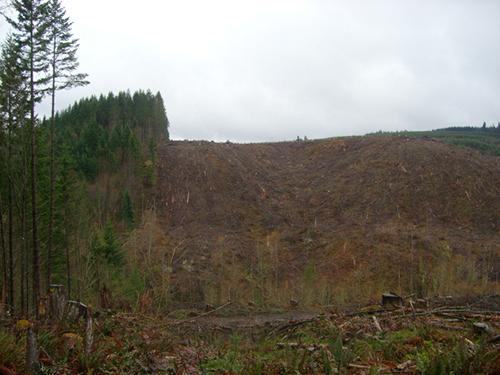Judge Rules In Favor of Logging Along Molalla River
Last Thursday, Judge Michael Mosman came out ruling against Bark in the Annie’s Cabin Timber Sale

Adjacent private land logging in the Annie's Cabin Timber Sale.
Nearly five years after the initial proposal for the Annie’s Cabin Timber Sale, Judge Michael Mosman released his opinion in the case over logging along the Molalla River. The forest watchdog group, Bark, had challenged the Bureau of Land Management on its compliance with laws with regard to water quality, threatened wildlife habitat and introduction of invasive species.
The Annie’s Cabin logging project is proposed to log along the community trail system in the Molalla River Recreation Corridor. The remaining forests in the watershed are rare, intact ecosystems surrounded by private industrial logging. Bark has spent five years, joined by other local community groups, tracking and participating in the environmental analysis required for logging on public lands.
“It is disappointing to have so many people and groups continue to be resistant to this logging proposal, despite the outcome of this court case,” said Amy Harwood, program director of Bark. “The project still has many outstanding concerns raised by the community members regarding impacts to recreation opportunities in the area.”
Local conservation groups and recreation users attempted to work with the BLM to modify the proposal to protect wildlife habitat and hiking trails, but in June 2007 the BLM proceeded to award the sale to Freres Lumber out of Lyons, Oregon. The Molalla River Shared-Use Trail System was created in the 1990s when the BLM closed 13 miles of logging roads and converted them into trails for hiking, mountain biking and equestrian use. The trail system was built and has been maintained by local group, Molalla RiverWatch.
The opinion can be found on Bark’s timber sale database.
The Annie’s Cabin logging project is proposed to log along the community trail system in the Molalla River Recreation Corridor. The remaining forests in the watershed are rare, intact ecosystems surrounded by private industrial logging. Bark has spent five years, joined by other local community groups, tracking and participating in the environmental analysis required for logging on public lands.
“It is disappointing to have so many people and groups continue to be resistant to this logging proposal, despite the outcome of this court case,” said Amy Harwood, program director of Bark. “The project still has many outstanding concerns raised by the community members regarding impacts to recreation opportunities in the area.”
Local conservation groups and recreation users attempted to work with the BLM to modify the proposal to protect wildlife habitat and hiking trails, but in June 2007 the BLM proceeded to award the sale to Freres Lumber out of Lyons, Oregon. The Molalla River Shared-Use Trail System was created in the 1990s when the BLM closed 13 miles of logging roads and converted them into trails for hiking, mountain biking and equestrian use. The trail system was built and has been maintained by local group, Molalla RiverWatch.
The opinion can be found on Bark’s timber sale database.
More about Annie 's Cabin, Missouri Ridge and 2006 Thinning Projects...




